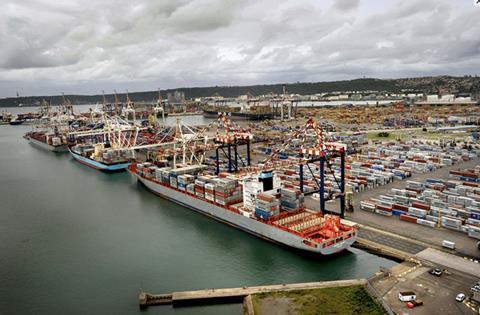A number of initiatives may open the door for a recovery at the country’s ports, which could boost the agriculture and export sectors
As pressure on South African rail and port operator Transnet mounts, there are indications that the government-owned conglomerate is going back to basics to improve performance.

Sources in the fruit export sector said this could bring some hope that the embattled rail and port operator has taken the first steps to recovery.
Transnet has for some time been in the news for all the wrong reasons – a failing rail system and port inefficiencies, astronomical losses on the rail system and eventually a spate of resignations of senior executives.
The conundrum is that Transnet is an organisation that reports losses and will therefore struggle to raise capital to reinvest in fleet maintenance and procurement on the scale that it needs. Without this, operational performance will not be turned around.
Yet, said Mitchell Brooke, Citrus Growers’ Association executive, a back-to-basics strategy could benefit efforts to turn the organisation around.
“The back-to-basics concept is essentially a drive to get the basics right at a foundational level, ensuring the most skilled people are employed and that they function at the best of their abilities, aligned to results and output objectives.
“A number of reforms are underway that, if successful, could see a turnaround of key corridors and networks,” he continued.
“The conundrum that faces Transnet could be resolved through policy reforms and partnerships on key strategic networks.
“Of importance is the implementation of the national rail policy which will see the rail network split from the operating of rail services on the network,” Brooke outlined. ”This will mean private rail operators will very soon be able to run trains on the national rail networks.
“This is a very important development for the citrus industry as the upscaling of rail transport is needed and can be aligned with private operators soon.
”Another important reform is the highly anticipated partnership between Transnet Port Terminals (TPT) and Philippines-based International Container Terminal Services (ICTSI) to manage the Pier 2 Container Terminal in Durban,” he confirmed. “It is believed that the partnership agreement will be in place by April 2024 and the company’s track record suggests a turnaround is inevitable.”
The citrus industry is also looking to a successful partnership to manage Ngqura Container Terminal (NCT) at the Coega port in the Eastern Cape.
Transnet Port Authority has requested from the Ports Regulator, through the tariff application, capital to invest in marine equipment on a large scale.
Transnet Port Terminals has also outlined maintenance schedules and fleet procurement schedules for Pier 1 at Ngqura in the Eastern Cape and the Cape Town terminals.
By way of these schedules, the fleet should be augmented ahead of the 2024 peak citrus season, and by then ship and terminal landside performance should be radically improved.



